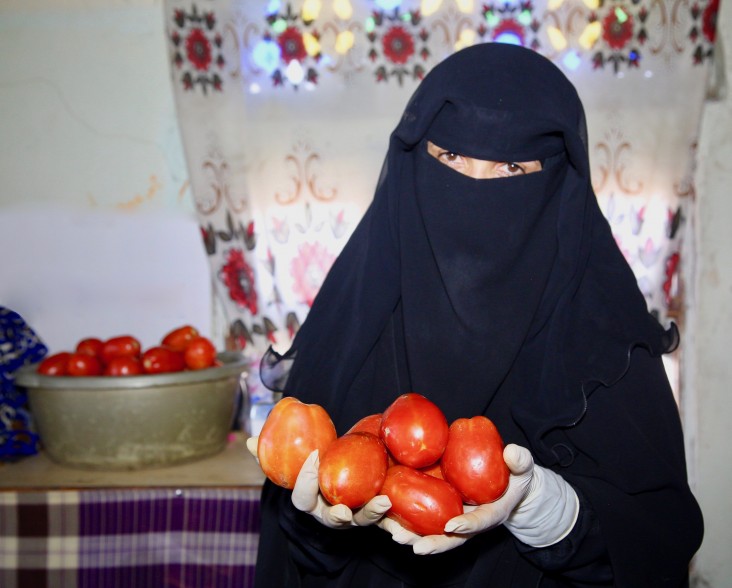Speeches Shim

Yemeni Women Build Self-Reliance in the Face of War and Famine
“The ability to sell our products in the market has broken down barriers and encouraged me and my neighbors to create our own small businesses. Now, we are providing for ourselves and our children—just like men.” – Roaida Abdo Ahmed
Roaida Ahmed lives with her husband and their three children in the Yemeni village of Al-Qara’a. For years, they made their living through farming, with tomatoes being a major crop. However, due to the ongoing war, farming no longer offers a viable source of income. Water is scarce, fuel prices are high, and the roads to the markets are no longer safe. As a result, Roaida’s family, like so many in Yemen, lives on the brink of famine.
In November 2018, Roaida participated in a USAID training program in her village. The course covered modern techniques to grow and process tomatoes with greenhouses and other technology that conserves water, fuel, and fertilizer. In addition to learning skills to improve production, enhance quality, and reduce waste, Roaida also gained hands-on experience making tomato sauce. She and her neighbors have since harnessed these tools not only to help feed their families, but also to start their own small businesses.
“We have been growing tomatoes for ages,” Roaida explains. “But it never occurred to us to make tomato sauce. This is a wonderful idea we learned from USAID. I hope that this will enable me to provide for my family so that we can lead a decent life.”
Roaida is one of over 3,500 farmers who participated in USAID training this year through the Yemen Economic Stabilization and Success (YESS) program. The program complements USAID’s humanitarian work by providing the Yemeni people with tools to rebuild their livelihoods and communities during the ongoing crisis. Through a unique enterprise-driven approach, USAID/YESS supports rural families not only in subsistence-level farming, but also in starting their own sustainable businesses. “For five years, these families have received aid,” says advisor Marzoq Mohsen. “But this is the first program that gives them tools to transition from being aid recipients to being providers for themselves, their families, and their communities.”
The USAID/YESS team began in early 2018 by identifying key markets where high-quality Yemeni products could offer increased returns to rural producers, sales organizations, and processors. They identified 28 agricultural clusters across the country that have the potential to link with profitable value chains—including coffee, honey, livestock, potato, and tomato. The team then conducted assessments of each cluster’s technical needs and provided training in practical solutions to meet those needs. Participants can use the skills they learn in the training to significantly enhance productivity, reduce postharvest losses, and add value to farm products through improved quality and marketing.
Roaida is among a handful of trainees who have since become trainers in their own right. She has already volunteered to train ten of her neighbors in tomato sauce production. “There are many women in the village who wanted to join the program,” she notes, “but they couldn’t because the seats were limited. By training other women, I can help to alleviate poverty in our district by giving them a chance to work and have a source of income for their families.”
In just a few short weeks, Roaida and her neighbors have begun to sell their sauce to local stores and restaurants. To support their business plan, USAID/YESS supplied them with blenders to enable more efficient production. With these tools, they are better able to compete with the factory-produced Chinese imports sold in the local markets. “Our sauce is all natural,” Roaida explains. “It’s free of chemicals and preservatives, and the taste is superb.”
In the coming weeks, USAID/YESS will continue to provide technical support to Roaida, her neighbors, and the thousands of other rural families that have participated in the program. According to Roaida, an obstacle that she and other women in her community face is the belief that women’s role is in the home. “It is traditionally believed in our district that women should only be concerned with housework, and providing for the family is not their business.” This makes selling the sauce a particular challenge. In response, USAID/YESS experts are continuing to work with Roaida and her neighbors to effectively market their product to new customers—and in the process to shift perceptions about the kind of work women are capable of performing.
Even though she and her family still contend with grave obstacles, Roaida is steadfast in her drive to build a brighter future for her family and her community. “We hope that the war in my country will end and that security, stability, and prosperity will prevail. We hope that prices will return to what they used to be and that farmers will return to cultivate their lands, workers will return to their jobs, and children will return to their schools.”
USAID’s Yemen Economic Stabilization and Success (YESS) program supports self-reliance and resilience by facilitating trade, increasing employment, supporting sustainable livelihoods, and stabilizing crucial macroeconomic policy issues. In the past year, YESS has leveraged private-sector commitments to generate over 3,000 jobs for at-risk populations by June 2019, built international stakeholder support for a trade facilitation agreement, provided livelihood support to over 3,500 farmers, and assisted the Central Bank of Yemen to articulate major macro-financial reform challenges and support needs. The program is part of the USAID Middle East Economic Growth Best Practices Project, which provides the Middle East Bureau, field missions, and operating units with tools to support economic growth and reform across the Middle East and North Africa.

Comment
Make a general inquiry or suggest an improvement.